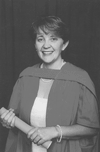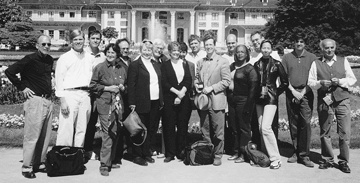
New
Horizons
Nursing
faculty are part and parcel of Emory's efforts to forge strong links with
the international community
By Pam Auchmutey
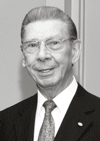
Named for a former executive with The Coca-Cola Company, the Claus M. Halle Institute for Global Learning promotes international studies that focus on Europe and Asia within a global context.
It is often the experience
of a lifetime when nurses choose to travel or work in other countries.
For faculty who teach at the School of Nursing, their global experiences
not only broaden their perspective and expertise but enhance their ability
to mentor students as caregivers and leaders.
This summer, three nursing professors participated in a faculty study-abroad
program in Germany sponsored by the Claus M. Halle Institute for Global
Learning at Emory. In the course of the 17-day program, 16 faculty members
from across Emory visited five cities, where they immersed themselves
in German banking and finance, politics, education, government, history,
culture, and the media. In addition to nursing, the group comprised faculty
from law, public health, history, political science, economics, film studies,
English, theology, business, and Oxford College.
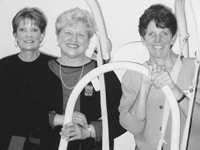 |
|
While
in Germany, Kathy Parker (left), Rose Cannon, and Joyce King exchanged
information on childbirth with experts at the Charite Hospital in
Berlin. They are shown with a birthing chair for maternity patients.
|
Before leaving in
May, the professors did their homework by attending orientation sessions
and reading extensively to prepare for a demanding schedule. That included
everything from meeting with members of the German parliament and the
Ministry of Health to visiting with high school students, hearing what
modern life is like for Jews living in Germany, and learning about the
European Central Bank. And there were memorable visits to historic sites
like the Freiberg Cathedral, where Gunter Blöbel, the 1999 Nobel
laureate in medicine, served as tour guide.
For Rose Cannon, the study-abroad program opened the door to a world of
meeting new colleagues and embracing new learning opportunities.
“One of the key benefits of the trip was getting to know faculty
from Emory who I didn’t know before,” says Cannon, a clinical
associate professor of nursing who specializes in maternal health. “As
a faculty member, I was reminded how important it is to know more about
what’s going on in other parts of the world. The minute we came back,
I wanted to see and hear more about world news. The people we met in Germany
knew more about us than we knew about them.”
Cannon and her nursing colleagues also had an opportunity to meet with
experts in their respective fields. In Berlin, Cannon, Clinical Assistant
Professor Joyce King, and Associate Professor Kathy Parker exchanged information
with a midwife and a perinatologist at Charite Hospital. The next day,
Parker met with colleagues at another Charite Hospital to compare notes
on nursing practice and research regarding sleep and pain.
“Nursing in Germany is not taught in universities,” says Cannon.
“Their education is hospital-based, much like US diploma programs
were several years ago.” German midwives, for example, complete a
three-year midwifery course after high school. Or they may study for three
years to become a nurse and then two more years to become a midwife. “The
latter track gives students a broader base and more opportunities to try
different specialties,” Cannon says.
King, a midwifery specialist, observed that midwives in Germany enjoy
less autonomy than their counterparts in the United States. “They
can perform an episiotomy but cannot sew it up,” she says. “A
doctor also must be present for delivery.”
Traveling in Germany impressed King in other ways. From the top of Berlin’s
capitol, she counted at least 200 constructions cranes in the former East
Berlin, which is undergoing significant reconstruction because of German
reunification. And she fondly remembers her visit to Freiberg, where a
family with young daughters welcomed her into their home. “We’ll
always be friends,” King says.
The study-abroad program reinvigorated her interest in the world at large.
“I went to high school in South Africa, and I’ve always loved
learning about other places,” she says. “My experience in Germany
has made a mark on my life and inspired me to pay more attention to international
issues. It’s so easy to focus on our own concerns when we’re
really part of a global community.”
Cannon returned home with a similar impression. “I’ll never
be the same,” she says. “An opportunity like this happens once
in a lifetime.”
Teaching the teachers in Ethiopia
Half a world away from Emory, other nursing faculty are helping bring
primary health care to more than 50 million people in rural Ethiopia.
Professor Joyce Murray and Associate Professor Maureen Kelley are assisting
educators there in developing standardized teaching methods and curricula
for training legions of community health workers.
Murray and Kelley are consultants to The Carter Center’s Ethiopia
Public Health Training Initiative (EPHTI). They are among a host of international
health experts who since 1997 have led regular workshops for instructors
from five Ethiopian universities and colleges. Through these workshops,
instructors are updating their teaching skills and creating study materials
to train the health officers, public health nurses, environmental sanitarians,
and laboratory technicians needed to staff more than 500 new health centers
during the next decade.
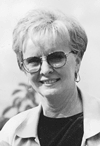 |
| Joyce Murray has found an attentive audience in Ethiopia, where she has led teaching workshops for health sciences faculty from five colleges and universities. |
“Many educators
in Ethiopia have little or no background in teaching methodology,”
says Murray, who co-led a teaching and learning workshop with former nursing
faculty member Fran Wenger this summer. “My job is to help them enhance
their teaching skills so they can become better teachers. Also, many of
the consultants are reviewing education and training materials for the
community-based health teams. We have seven to eight training modules
close to completion thus far.”
Like Murray, Kelley is helping review the content of these training modules,
each of which addresses a specific national health priority. Kelley is
also part of an EPHTI project to instruct health care workers in providing
family planning and women’s reproductive health services.
Although Kelley knew quite a bit about Ethiopia’s health status before
her first trip last spring, she returned home with a deeper appreciation
for what the nation is attempting to do.
“The experience is hard to capture in one adjective,” she says.
“It was interesting, educational, enriching, heartbreaking, and inspiring
all at the same time. The Ethiopian faculty with whom I worked are dedicated,
caring individuals. They are extremely gracious to visitors, willing to
talk about their country, and anxious to hear about others’ experiences.”
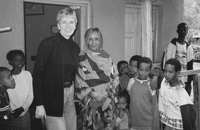 |
| While in Ethiopia, Maureen Kelley (left) met caregivers like Hana Fundee, a traditional birth attendant and midwife. Kelley is participating in a project to instruct health care workers in providing family planning and women’s reproductive health services. |
Kelley was also struck
by the magnitude of health problems in a country that has only one neonatal
intensive care unit and where HIV, tuberculosis, trachoma, diarrheal disease,
and high maternal and infant mortality rates are prevalent.
“The solutions to these problems have to be approached from a primary
prevention point of view,” she explains. “Ethiopia lacks the
resources to buy expensive drugs or pay for intensive care units. Efforts
must be directed toward educating families about how to care for themselves
and their children. This information is best delivered by teams of health
professionals, which is what the EPHTI supports.”
As Murray notes, the EPHTI is building capacity within the country so
that efforts to improve health care will continue long after the initiative
ends. In the process, Murray is working with three nursing alumni (all
96MSN), whom she advised when they were at Emory. Berhane Gebrekidan,
formerly head of the nursing school at Jimma University, continues to
teach on the nursing faculty there. Asrat Demissie also teaches in the
nursing school and leads Jimma’s public health program as dean. And
Befekadu Dinno is an official with the Ministry of Health.
Murray is definitely proud of what her former students have done and will
continue to accomplish. “It’s gratifying to see how their graduate
education helped them move into leadership positions to advance health
education in their country.”
Influencing nursing practice in
Fiji
Nursing faculty are natural mentors for students, and those bonds sometimes
stretch across the globe. That was especially true for Jenny Williams
and Maryam Haddad, both 01MSN/MPH, who had to contend with a political
coup to complete their master’s thesis.
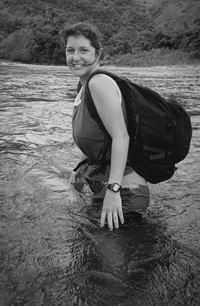 |
| Jenny Williams crosses a river in Fiji to reach the village of Laselevu. |
In spring of 2000,
both students had received Hubert International Fellowships (funded by
the O.C. Hubert Charitable Trusts) to complete the public health requirement
for their joint degree. Their project was ambitious—to review Fiji’s
new nurse practitioner program for the World Health Organization (WHO)
and the nation’s Ministry of Health. Suddenly, in May 2000, a group
of armed citizens stormed Fiji’s parliament and took several hostages.
By late summer, the political unrest had brought a halt to the students’
plans, or so they thought. Recalls Haddad, “The week after we said
good-bye to Fiji in our minds, we got an e-mail saying to push forward
with our project.”
That welcome message came from the nursing school’s own Elizabeth
Downes, who at the time was working in Fiji as a WHO consultant. Haddad
and Williams finally made it to Fiji in November 2000.
For the next two and a half months, they flew, rode, walked, and waded
a river to visit seven rural health centers operated by nurse practitioners
in the Fiji Islands. The men and women they met were among the first nine
nurse practitioners to graduate from Fiji School of Nursing in 1999. Downes
had advised the Ministry of Health on establishing the NP program to ease
the nation’s physician shortage and to provide access to primary
health care in remote areas.
“We were not evaluating the nurse practitioners themselves,”
Haddad explains. “We were evaluating how well their training had
prepared them for the conditions in which they were working and how well
communities were accepting this new type of provider in the health care
system.”
All in all, the students found that the nurse practitioners were doing
an excellent job of providing preventive and curative care and building
partnerships and promoting health in their communities. “The outreach
that the nurse practitioners are doing is commendable,” says Williams.
“They might walk six hours carrying heavy equipment to get to a village.
It is amazing.”
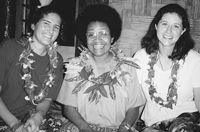 |
| Maryam Haddad (left) and Jenny Williams (right) gained a profound respect for what Asenaca Baleirara and other nurse practitioners are doing to provide basic health care in Fiji. |
Williams and Haddad
now work with the Epidemic Intelligence Service with the Centers for Disease
Control and Prevention. Before graduating in May, they sent reports to
the nurse practitioners and their communities in Fiji, in addition to
WHO and the Ministry of Health. “The most wonderful part of the trip
was meeting such dedicated nurses,” says Haddad. “We met everyone
from brand new graduates to senior nurses who had been in practice since
the British colonized Fiji. They are tremendous nurses and wonderful practitioners.”
Downes knows this well, having worked with nurses in Fiji and Africa.
“Most developing countries cannot afford to maintain doctors in rural
areas. Many can’t hold onto physicians in urban centers,” says
Downes. “That is where the role of a primary care nurse practitioner
becomes so effective. In the United States, the nurse practitioner complements
the care of physicians. But in developing nations, nurses are sometimes
the only care.”
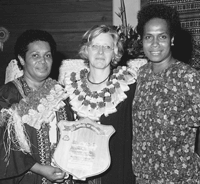 |
| The Fiji School of Nursing has recognized Elizabeth Downes (center) by creating an advance nursing practice award named in her honor. Downes is pictured with Filo McKay (left) and Taina Kubulala, two of the school’s nurse practitioner graduates. |
She returned from
Fiji this year to resume her role as assistant professor in the School
of Nursing and to serve as academic program coordinator for the Lillian
Carter Center for International Nursing. As such, she continues to provide
technical assistant to Fiji, where the NP program has expanded to include
nurses from the South Pacific region.
“Nurses there are hungry for education,” says Downes. “They
want to do what they love to do, only better. Aside from working with
a great group of faculty at the Fiji School of Nursing, they will learn
to deliver better care and train health care workers to do the same when
they return to their communities.”
